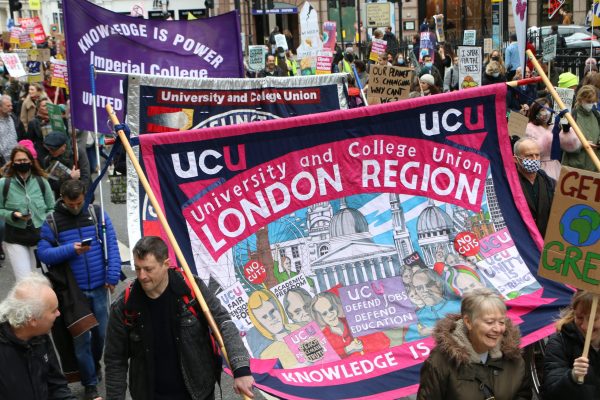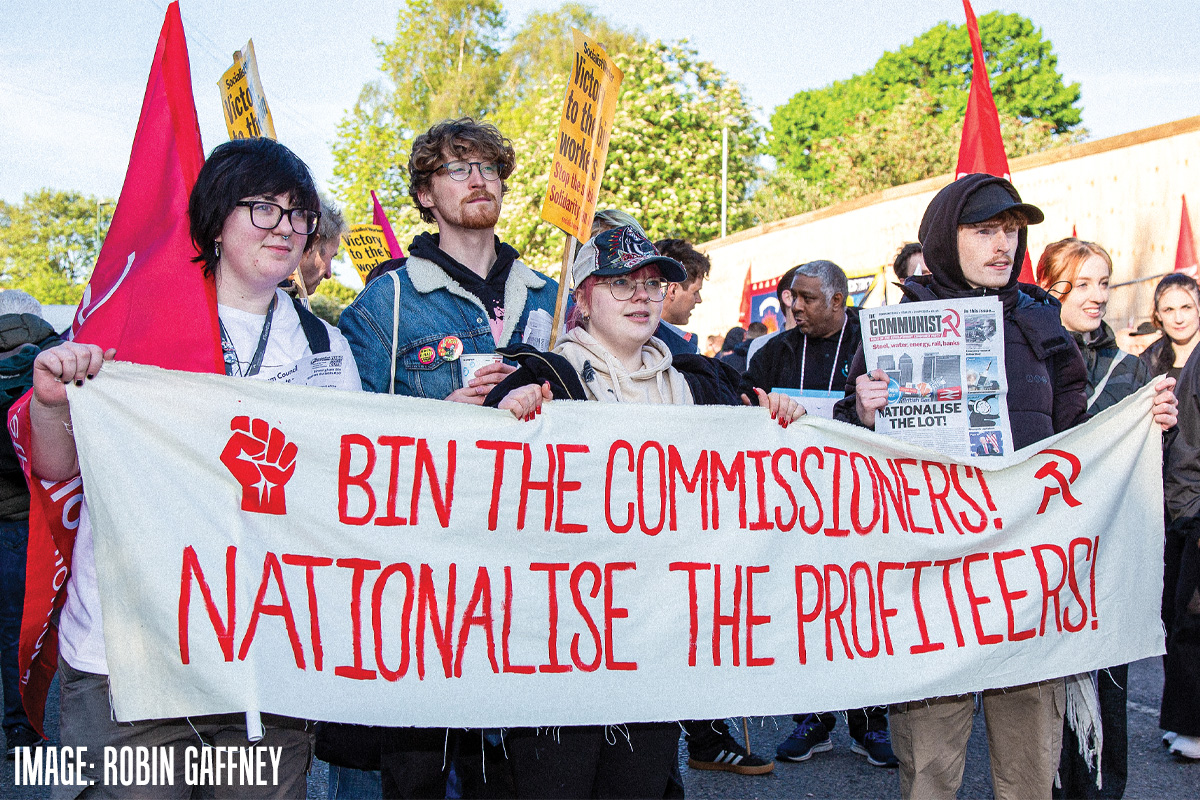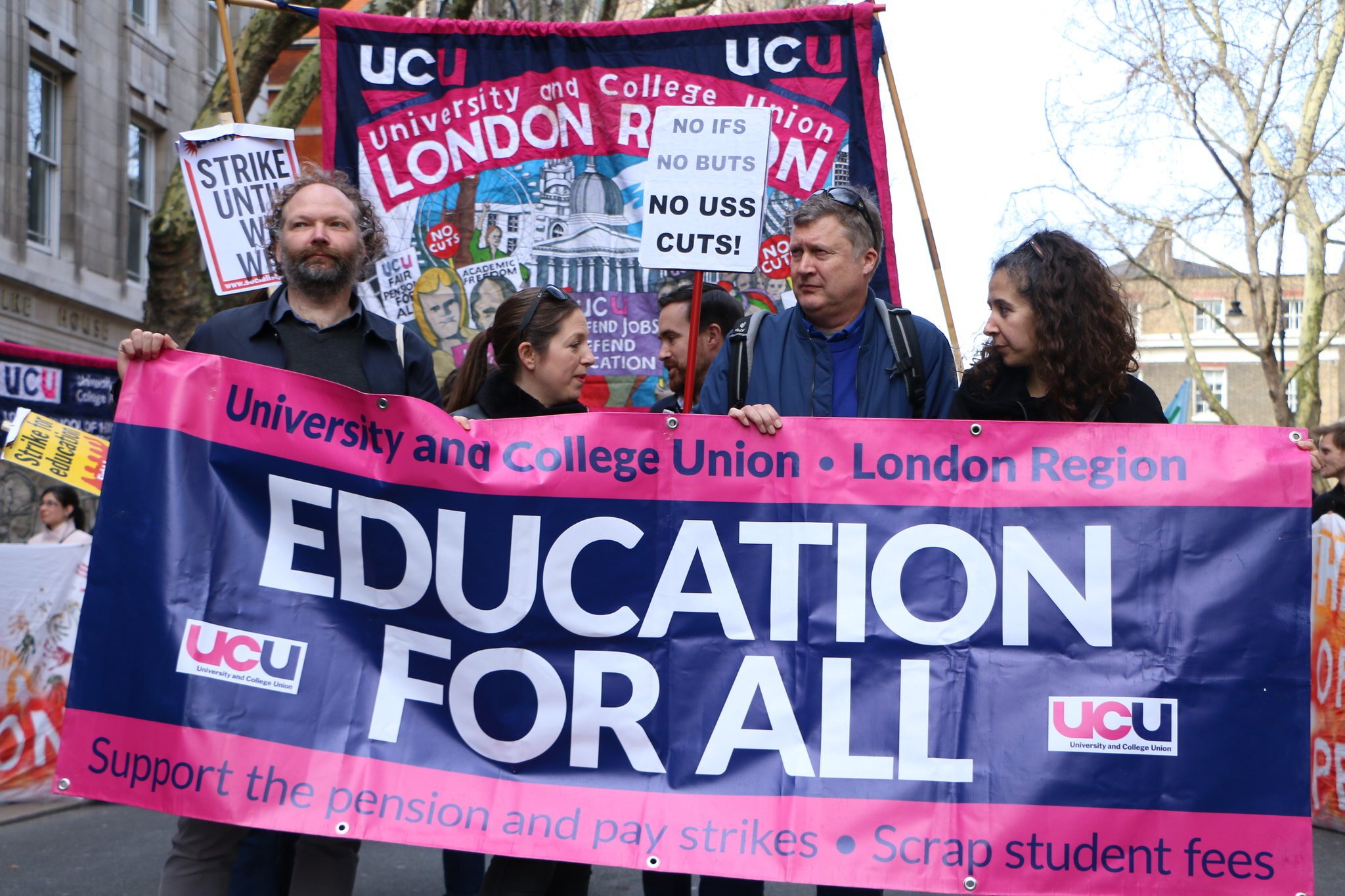Ballots have now dropped for a new wave of national strike action in higher and further education.
After years of cuts and attacks by senior management and vice chancellors – and many rounds of industrial action against them – the need for further coordinated national action, at a higher level than seen before, has become obvious to increasing layers in the UCU.
The bosses’ original demand for job cuts of 10,000 has already been surpassed. The official mouthpieces of the establishment say closer to 15,000 staff have been laid off. Other sources put the number as high as 20,000.
Now, a further 3,000 cuts are being demanded, while university and college staff have been offered a paltry pay increase of 1.4 percent (well below expected inflation for this year).
Importantly, it is not just the UCU balloting at this time. Unite, Unison, and EIS (Education Institute of Scotland) have all rejected this pay offer and are putting out similar ballots for coordinated strike action. In the likelihood that these ballots all succeed, then the path is cleared for complete university shutdowns.
The tone set for the dispute is becoming increasingly political. Earlier this year, the UCU voted to open a trades’ dispute – that is, to fight directly against Starmer’s Labour, rather than university bosses. The current ballot’s demands, meanwhile, are directed at the government.

The UCU therefore stands at the cusp of a movement that has the potential to rock Britain.
Defeating Starmer on university cuts means defeating the government on its austerity programme, at a time when the Labour leaders will be trying to pass a hated budget.
It is therefore imperative to connect this struggle to the wider anger across society – and channel it towards the demand to make the billionaires pay for the crisis.
The union should wage a political battle first among the students: explaining why the UCU fight for funding is the same as students’ fight for high-quality, free education – a fight against marketisation.
At the same time, every effort must be made to connect this fight with the other unions’ ballots on campuses: coordinating activists from the department and campus level up to the national.
We can expect that once it is in motion, the strike will get a lot of bad press. But the UCU should use this to its advantage. When all eyes in Britain are fixed on this struggle against austerity, the university fight will resonate with workers in councils, the NHS, schools, civil servants, railways, and so on.
The call must therefore be made for coordinated action across the public sector: against the Autumn Budget, against marketisation and privatisation, and against capitalism!
Caleb Sharp, UCU (personal capacity)
Leonardo strike: Class action against war barons
This month, Unite-organised workers at the arms company Leonardo voted overwhelmingly to strike against a real-terms pay cut – with nearly 3,000 workers in Yeovil, Edinburgh, Newcastle, Luton, and Basildon potentially walking out.
In 2024, Leonardo had profits of over €1.5 billion!
This outbreak of struggle may not be for Palestine today – but these workers are on the move in response to the same crisis everyone else faces, and they are employing class methods to achieve their aims.

The potential demonstrated in these methods flies in the face of all those on the so-called ‘left’ who have written off British workers engaged in the supply chain of Israeli goods and weapons as a lost cause.
Some people say these workers’ conditions and pay are simply too good, and that their interests are therefore aligned with those of the British and Israeli ruling-classes.
They condemn these workers as a lost cause. Some activist groups, desperately opposed to the genocide in Gaza, have stood at the factory gates hurling insults at those who face the same crisis as the rest of us: squeezed at work; drowning in debt; unable to get seen in the NHS; struggling with bills…all while the government sends money abroad for war.
That is the context in which these workers have taken up some of the few remaining manufacturing jobs left in Britain – not because they are bloodthirsty Zionists.
Robbie Laverick, Newcastle
If Birmingham’s councillors won’t play by the rules, then neither should we!
Leaked footage has exposed Birmingham City Council’s latest weapon in its fight against striking bin workers. A manager from the agency firm Job&Talent has been caught on camera, admitting that the council will blacklist any worker who decides to join the strike.
Clearly, the council is trying to wrap up this dispute before it can regain new momentum. Agency workers were refusing to cross the picket lines due to their own unsustainable workloads and toxic workplace culture.
This great example of solidarity action had the potential to breathe new life into the Birmingham struggle, as agency workers were the main tool the council used to undermine the strike.
So despite already having the full backing of the British establishment, Birmingham ‘Labour’ council are willing to break the law – blacklisting workers – if it means a swift victory! And we have no doubt that these scabbing politicians will face far greater impunity than strikers received from the courts for ‘illegal hard picketing’.

Time is now decisive. Sharon Graham has rightly condemned the council’s despicable behaviour. But Unite’s leaders unfortunately continue to take a conciliatory approach, calling for Starmer’s government to intervene. They even apologised for the effective hard-picketing undertaken at the height of the struggle!
It is clearer than ever that the game is rigged against us. The unholy alliance of politicians (in Westminster and Birmingham), bosses, and judges are hell-bent on crushing bin workers so they can make workers pay for their budget crisis.
Yet they are clearly worried. Unite leaders should be going on the offensive: linking up the strikes that the union has across many sectors; linking those with strikes by other unions especially in the public sector; and telling every workplace about Birmingham council’s scabbing role.
A united strike to bring down the anti-union laws – in solidarity with Birmingham’s striking workers, and against Starmer’s austerity – is possible. We need to fight to overthrow the rulemakers, not play by their game!
Michael Omatsola-Morgan, Birmingham
Jaguar threatened with extinction
Jaguar Land Rover (JLR) has been paralysed by a major cyberattack, halting vehicle production, registration, and payments to suppliers and workers. Despite promises to resume by late September, production remains stalled, with no clear end in sight.
JLR directly employs 30,000 people, but over 200,000 depend on its supply chain. At my workplace, which employs over 200 staff (60 percent of whose output goes to JLR), workers now face ‘rotating’ layoffs: reducing – and in the worst cases, halving – hours, and therefore pay.
Other suppliers have already laid off most of their workforce, as the effects continue to ripple throughout the industry. Even once JLR recovers, many suppliers will be too weakened to resume production at previous levels, making a full recovery unlikely.
This cyberattack, however, exposes the deeper crisis of British capitalism. In 2016, Britain produced 1.6 million cars. By 2025, the country is projected to produce just 755,000 – lower than during the pandemic!

Foreign investors, looking for higher profits and cheaper labour abroad, have steadily withdrawn. The government’s solution – ‘investment injections’ – resembles pouring water into a leaking bucket. Their vaccines treat symptoms, not causes.
Companies like Tata (JLR’s parent) are exploiting the crisis to justify layoffs and relocation of production overseas, with British and European manufacturers facing industrial decline due to intensifying global competition.
China, with its state-backed investment in battery and electric vehicle manufacturing, now dominates the market. Even heavily-funded European ventures like Northvolt – once hailed as the continent’s EV hope – have failed to compete, losing €5 for every €1 earned.
The unions’ response has been to call for temporary measures such as furlough schemes or government loans. While these may offer short-term relief, they do not address decades of underinvestment in automotive production and research.
At the same time, any government intervention will likely come with strings attached – especially under Starmer’s continuing austerity.
The JLR crisis reveals the inability of British and European capitalists to invest in high-skilled industry. Only a united European working class can harness the continent’s resources and skills to achieve what capitalism cannot: stable, sustainable industry, serving public need, not private profit.
Davey, Coventry






